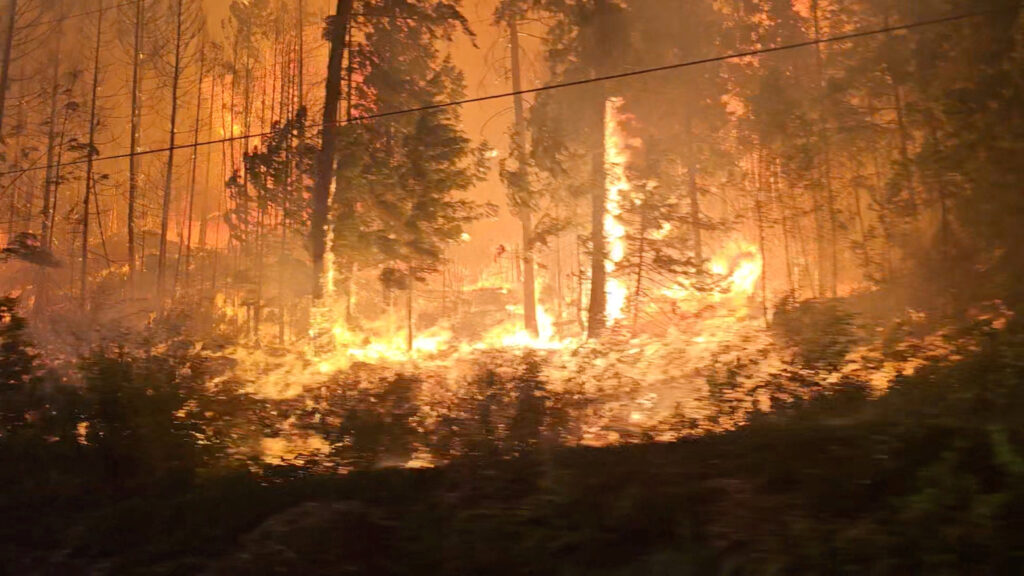Canadian firefighters wage epic battle to save communities after mass evacuations

A view of fire close to highway near Sorrento, British Columbia, Canada, August 18, 2023 in this screen grab obtained from social media video. Nikki Goyer/via REUTERS
VANCOUVER, British Columbia — Firefighters battling wildfires in Canada on Saturday sought to stop flames that swept through the West Kelowna suburbs in British Columbia, forced the evacuation of a university campus and fouled the air with thick smoke.
The entire province was under a state of emergency as firefighters waged an epic battle, while firefighting reinforcements and calmer weather provided hope for a reprieve during Canada’s worst fire season on record.
READ: Wildfire closing in on capital of Canada’s Northwest Territories; city empties as thousands flee
Fires in Kelowna
No deaths were reported in the blazes but firefighters said a significant number of structures have been destroyed in the fires around Kelowna.
Elsewhere, a small amount of rain fell overnight — about 4 millimeters — and humidity was high enough to dampen fire activity, helping weary firefighters in the Northwest Territories, Mike Westwick, wildfire information officer, said Saturday. The fire remained about 15 kilometers (9 miles) from the city Saturday.
“We’re by no means out of the woods yet,” Westwick told The Associated Press. “We still have a serious situation. It’s not safe to return.”
READ: Canada’s Northwest Territories declares emergency due to wildfires
Unbearable smoke at Yellowknife
Yellowknife, the capital of the Northwest Territories, was a virtual ghost town after nearly all of the city’s 20,000 residents fled under evacuation order.
Charlotte Morritt was among those who left on Thursday, reaching that decision because of the unbearable smoke that had become unhealthy for her 4-month-old son.
Morritt, a journalist with the Aboriginal Peoples Television Network, and her son took an evacuation flight some 1,500 kilometers (950 miles) to safety in Yukon province, while her partner stayed behind to monitor their property, and help create firebreaks and fight fires.
“We knew it was only a matter of time,” said Morritt, who had been following media updates and satellite images of the approaching wildfires.
READ: Canadian wildfires hit Indigenous communities hard, threatening their land and culture
Canadian firefighters remain in Yellowknife
Authorities were concerned that Yellowknife’s only escape route could be cut off by the fires. About 2,600 people remained in the city Saturday, including emergency teams, firefighters, utility workers and police officers, along with residents who refused to leave.
The fires were unnerving for residents, with plumes of smoke visible by day and an eerie orange nighttime glow.
READ: Wildfires ‘off the charts’ in Canada as temperatures climb
Trudeau: We’ve got your back
Prime Minister Justin Trudeau, who met Friday with some of the Yellowknife evacuees in Edmonton, Alberta, on Saturday shared on X, the social media platform formerly known as Twitter: “We’ve got your back.”
Trudeau praised firefighters, police, military personnel, the Red Cross and others who responded to the fires and other natural disasters this summer.
“Terrible loss, increased extreme weather events. And all through it, we’ve seen Canadians step up,” he told reporters in Edmonton.
Canada has seen a record number of wildfires this year that have caused choking smoke in parts of the U.S. All told, there have been more than 5,700 fires, which have burned more than 137,000 square kilometers (53,000 square miles) from one end of Canada to the other, according to the Canadian Interagency Forest Fire Centre.
READ: Raging Canada wildfires threaten critical infrastructure, force evacuations
Order to evacuate
The University of British Columbia Okanagan campus in Kelowna, which had fewer than its usual 11,000 students during a summer session, received the order to evacuate Friday afternoon. The order remained in effect Saturday.
Ian Stewart and his wife also made the “anxiety producing” decision Friday to evacuate Kelowna with their 4-year-old border collie and drive 335 kilometers (210 miles) to Clearwater, B.C.
“The smoke was really oppressive and there were big chunks of ash falling everywhere,” he said Saturday.
READ: As Canada’s wildfires intensify, recruiting firefighters is tougher
Air tankers
They packed a couple of suitcases, passports, laptop computers and dog food, and drove in bumper-to-bumper traffic to escape.
In Yellowknife, air tankers dropped water and fire retardant on the flames. A 10-kilometer (6-mile) fire line was dug, and firefighters deployed 20 kilometers (12 miles) of hose and a plethora of pumps in the fight to keep the fire at bay.
READ: Canada on track for its worst-ever wildfire season
19,000 left Yellowknife in 48 hours
About 19,000 people had left Yellowknife in under 48 hours, with about 15,000 driving out in convoys and 3,800 leaving on emergency flights, officials said. The last 39 hospital patients were flown out Friday night on a Canadian Forces plane, officials said.
By Saturday, the streets were nearly empty and stores and gas stations were shuttered.
“It’s a ghost town,” said Kieron Testart, who had gone door-to-door in the nearby First Nation communities of Dettah and NDilo to check on people Friday.
Disclaimer: The comments uploaded on this site do not necessarily represent or reflect the views of management and owner of Cebudailynews. We reserve the right to exclude comments that we deem to be inconsistent with our editorial standards.
